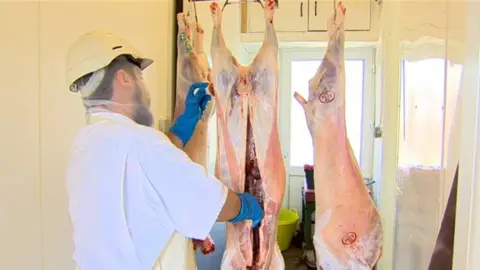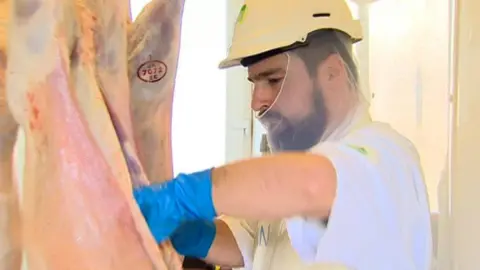Meat inspectors shortage 'crisis' blamed on Brexit
 BBC
BBCThe UK is facing a serious shortage of meat inspectors with big implications for trade and animal welfare, BBC Wales has learnt.
The company which supplies Official Veterinarians (OVs) for the Food Standards Agency (FSA) says it has reached "crisis point".
It blames Brexit uncertainty for the loss of 20 vets a month.
The FSA said it was "working on a number of contingencies" to ensure standards were maintained.
OVs audit and inspect meat processing sites, certify imports and exports, and carry out official disease control measures such as TB tests.
Jason Aldiss, managing director of Eville & Jones, which is based in Leeds and provides OVs for every abattoir in England and Wales, said he was finding it more and more difficult to recruit staff.
It employs about 550 vets and said 98% come from outside the UK.
"Our recruitment programme is running at full pace and yet we're not able to keep up with the loss of vet staff that are moving out," said Mr Aldiss.
"Brexit has hit as far as we're concerned - we are at crisis.
"My company has already lost £2.5m because of paralysis in government, lack of direction and the lack of an understanding about the real implications of what is happening now."
Mr Aldiss wants ministers to include vets on what is known as the UK Shortage Occupation List but says so far he has received "warm words but very little action".

But Ivan Mihnev, a Bulgarian OV who works in Wales, said he is not too worried about Brexit because he believes the industry is so dependent on European vets.
"Britain needs European people to do this job," he said. "Do you know how many British people do this job? Nobody."
Chris George, director of WJ George Butchers in Talgarth, Powys, which has its own slaughterhouse, sees OVs weekly, inspecting the animals and checking the meat is fit to be eaten.
He is worried a shortage of vets could mean slaughter operations having to be centralised.
"For quite a few years we've had vets from Spain, Poland, Bulgaria. A lot have come over from small animal practices. It's going to be a challenge, I don't know whether we'll have to retrain people - it could be a minefield."
An FSA spokesman said: "The impact of EU Exit on the veterinary workforce is something we are considering as part of our wider work looking at potential audit and assurance arrangements after the UK leaves the EU."
A Defra spokesman said it had maintained the number of vets involved in disease detection, preparedness and control, which meant it was "well-prepared to deal with animal diseases".
The spokesman added: "We want to ensure that UK government and veterinary businesses have access to sufficient number of veterinary surgeons, meat hygiene inspectors, slaughter men and livestock drivers once we leave the EU."
